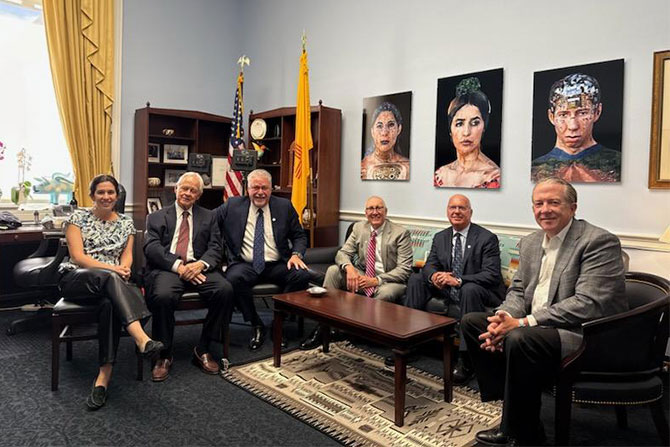The 2025 Legislature adjourned on Saturday, March 22, having considered nearly 1,200 bills. A total of 195 of those bills ultimately passed both houses of the Legislature. The governor had until April 11 to approve or veto those bills sent to her by the Legislature for review. She ultimately ended up vetoing 35 bills and signed the remaining bills into law.
At her press conference shortly after the close of the session, the governor criticized the legislature for its failure to enact juvenile crime measures she supported — measures that would have imposed longer sentences for juveniles convicted of certain enumerated crimes and lowered the age at which minors could be tried as adults for certain crimes. She has threatened to bring the legislature back into a special session to force action on those criminal proposals. It has been rumored that the governor is also considering calling a special session to address health care, including revisions to the New Mexico Medical Malpractice Act.
Tax Package
What started as a $130 million tax increase tax package (HB 14) ended up much leaner. The enacted bill provides:
- No increased tax on oil production.
- A 20% tax increase on wholesale liquor, sending $10 million in revenues to the Tribal Alcohol Harms Alleviation Fund.
- $113 million, to be funded from next year’s budget, for:
- $250 per foster parent/guardian personal income tax credit — $8.8 million.
- GRT exemption for co-insurance payments for medical services — $22.5 million.
Surprisingly, the bill was vetoed by the governor.
Budget — HB 2
HB 2 includes total authorized recurring spending of $10.65 billion from the general fund for FY26 for agency operations and $141.2 million for compensation.
Total recurring spending reflected in the bill for FY26 is just over $10.79 billion, almost $611 million, or 6%, above FY25. The bill also keeps state reserves at 30%, reflecting the target set by the Legislative Finance Committee in budget guidelines adopted in fall 2025.
For nonrecurring appropriations, when considering all revenue sources, the HB 2 amendment appropriates a total of $1.56 billion for special appropriations, $183.7 million for supplemental and deficiency appropriations, $107.4 million in information technology appropriations, $457.8 million in Government Results and Opportunity fund spending, typically for two-to-three-year pilot programs, $1.6 billion in fund transfers and $189.5 million for transportation.
Other Appropriations Contained in HB 2
- $24 million in site readiness, which prepares prime, construction-ready locations for companies to quickly and easily set up in New Mexico.
- $25 million in funding for research and development initiatives to help attract new and growing industries to the state.
- $65 million for road maintenance across New Mexico.
- $12 million for rural air service statewide.
- Funds research to strategically plan the state’s water future, with $19 million to New Mexico Tech for groundwater monitoring and improvements, and $4 million for water research at New Mexico State University.
- $20 million to clean up abandoned uranium mines and other contaminated sites.
- $50 million to help New Mexico communities recover from fires and floods.
- Directs $1.24 million to hot shot fire crews, watershed management and forest restoration.
- $4 million to law enforcement recruitment and retention.
- $500,000 for crime victim reparations.
- $2 million to support victims and survivors of sexual assault and domestic violence.
- $15 billion in state and federal funding for Medicaid and other critical health care services.
- Dedicates substantial funding to mental and behavioral health care, including $280 million to expand infrastructure and access with regional coordination to get funds to areas most in need, and key funding for crisis response systems.
- $100 million down payment to start the new Behavioral Health Trust Fund.
- $25 million to the Rural Health Care Delivery Fund to expand health care in rural areas.
- $110 million to targeted housing development, including transitional housing, with a focus on Albuquerque, Bernalillo and Dona Ana counties.
- $45.9 million available to housing providers to focus on specialized housing solutions and a strategic response to homelessness.
- Improves food security for New Mexicans with $10 million in annual funding for food banks.
- $4.7 billion in recurring funding for public education, a 6% increase over last year.
- Raises minimum teacher salaries by $5,000 per license level.
- Increase funding to the Early Childhood Education and Care Department by $170 million, or 21.6%, to greatly expand pre-K, childcare assistance, home visiting and tribal language support.
- Increase public school funding by $76 million to support students in grades 6-12.
- Continues funding for the teacher loan repayment program, to retain and attract more educators to New Mexico.
The NMBA Legislative Priority List of Bills Supported or Opposed
Public Banking Act (HB 130): The bill did not pass; NMBA opposed it. The bill would have enacted the Public Banking Act in which it would establish the Public Bank of New Mexico. The bill is very similar to the bills which have been introduced in past legislative sessions — establishing a board of directors; permitting certain investments, lending actions, purchases and property transactions. The bill appropriated $50 million to the state banking fund to capitalize the bank. Only $4 million could be utilized for establishing and chartering the bank and developing the bank’s lending program. Another $60 million was appropriated to the bank to be deposited in an account with the bank.
Artificial Intelligence Regulation (HB 60): The bill did not pass; NMBA opposed it. The bill would have enacted the Artificial Intelligence Act. Artificial intelligence system is defined as a machine-based system that for an explicit or implicit objective infers from the inputs the system receives how to generate outputs, including content, decisions, predictions or recommendations that can influence physical or virtual environment. The bill required notice of use, documentation of systems, disclosure of algorithmic discrimination risk and risk incidents. It also required risk management policies and impact assessments. It provided for enforcement by the State Department of Justice and for civil actions by consumers for injunctive or declaratory relief. The bill was patterned after a recently-enacted AI bill in Colorado. It contained a definition of financial institution, which was too narrow.
Paid Family and Medical Leave Act (HB 11): The bill did not pass; NMBA opposed it. This issue has been one of the more controversial proposals facing the legislature since 2019. Under the proposal, employees would pay 0.5% of wages while employers with five or more employees would pay 0.4% payroll tax. The rates are subject to adjustment annually. A state-run fund was established to administer leave payments. The bill applied to all industries and mandates compliance. The Workforce Solutions Department would manage the program. The definition of family member is broad to include an applicant’s spouse or domestic partner or a person related to an applicant or applicant’s spouse or domestic partner such as a grandchild, grandparent, a biological, foster, step or adopted sibling; a spouse or domestic partner of a family member, an individual whose close association with the applicant or domestic partner is the equivalent of a family relationship. The bill included several other categories of family members. The bill also provided for the Paid Family and Medical Leave program to pay an eligible applicant a percentage of the employee’s wages to allow the applicant to bond with a new child, care for a family member, prepare for and adjust to a spouse’s military deployment or to take action to protect the employee or the employee’s family member from certain forms of violence. Also included is a preemption for similar programs, which was extremely narrow. The legislation would provide 12 weeks of paid parental leave and nine weeks paid medical and safe leave, which could eventually increase to 12 weeks.
Interchange (HB 476): The bill did not pass; NMBA opposed it. The bill would have prohibited interchange on the tax and tip portion of every credit and debit transaction. Illinois is the only state with a law similar to HB 476. That law is being litigated in federal court, and the judge in that case has ruled based on preemption that Illinois state-chartered banks and credit unions are the only financial institutions required to comply.
Medicaid Trust Fund (SB 88): The bill passed; NMBA supported it. The bill will establish a permanent fund to support the state’s largest health care expense, Medicaid. The bill proposes an initial investment of $300 million and a variety of ongoing funding sources to increase the fund to $2 billion, including unspent capital outlay dollars. When the trust fund reaches its target level, it will generate $100 million yearly for the state’s share of the Medicaid program. Every one of those state dollars is matched by $3 in federal funding, meaning that this fund will ultimately generate $400 million annually, making it an extremely valuable long-term return on investment for all New Mexicans. Those dollars can help the state raise the reimbursement rates for health care providers who treat patients insured under Medicaid — 42% of all New Mexicans. Increasing those reimbursement rates will help New Mexico recruit and retain more doctors since New Mexico has a higher proportion of patients insured by Medicaid than any other state, and Medicaid often pays less than the cost of providing treatment. The governor signed the bill into law.
Conservator Liability (HB 125): The bill did not pass; NMBA supported it. The bill allows courts presiding over a conservatorship to enter orders to approve actions or proposed actions or conservator reports if and only if the conservator files a petition and notifies the protected person, the conservator and other persons determined by the court and the court conducts a hearing with notice having been provided to the same parties. In the case of the death of the protected person, notice would have to be given to that person’s heirs and the personal representative named in the deceased person’s last will and testament. Releases of liability for conservators signed by the protected person are invalid.
Investment of Government Funds by State Treasurer (HB 541): The bill did not pass; NMBA supported it. The bill would have expressly authorized the state treasurer to invest funds in the same vehicles as those currently authorized for county and municipal treasurers, including “federally insured obligations, including brokered certificates of deposit, certificate of deposit account placement services and federally insured cash accounts.” These “federally insured obligations” consist of deposits placed at network banks through a deposit placement network.
Redaction of Public Records (SB 171): The bill did not pass; NMBA supported it. The bill amends existing law that provides most documents filed with the county clerk are public to allow for certain personal information to be redacted if the document is requested by a third party. Specifically, the county clerk could redact the month and day of the date of birth and all but the four last digits of a social security number or driver’s license number.
Other bills monitored by the NMBA included (not a complete listing):
- Prevailing Wage on IRB Projects (HB 6): Bill passed. Signed by governor.
- Embezzlement Penalty Enhancement (SB 155): Bill passed. Signed by governor.
- State Fairgrounds District Act (SB 481): Bill passed. Signed by governor.
- Local Government Rent Control (SB 216): Bill did not pass.
- Student Loan Bill of Rights (HB 224): Bill did not pass.
- Strategic Bitcoin Reserve Act (SB 275): Bill did not pass.
- Veteran Property Tax Exemption (HB 47): Bill passed. Signed by governor.
- Oil and Gas Royalty Rate Increase (SB 23): Bill passed. Signed by governor.
- Technology and Innovation (HB 20): Bill passed. Signed by governor.
- Strategic Economic Development Site Readiness (SB 169): Bill passed. Signed by governor.
- High Wage Jobs Tax Credit (HB 368): Bill passed. Signed by governor.
- Housing Trust Fund (SB 145): Bill did not pass.
- Baby Bonds (SB 397): Bill did not pass.
- Unfair Trade Practices Act (HB 61): Bill did not pass.
- Deposit of Will (HB 132): Bill did not pass.
- Increase Corporate Income Tax (SB 141): Bill did not pass.








